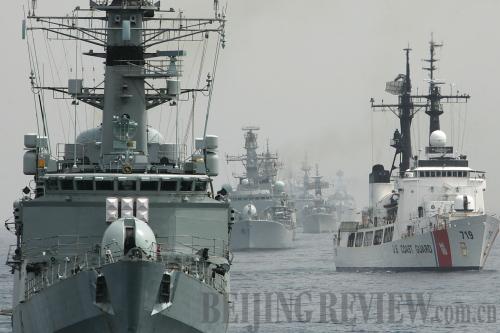|
 |
|
JOINING FORCES: The Chinese Navy's Guangzhou destroyer (left) participates in the Aman-09 multinational naval exercise in Karachi, Pakistan, in March 2009 along with a U.S. Coast Guard vessel (WANG XIANG) |

Since Al Qaeda's devastating attacks against the United States on September 11, 2001, terrorism has emerged as a pressing challenge to world peace. Antiterrorism has remained at the top of the global security agenda over the past decade. As a permanent member of the UN Security Council, China has made great contributions to the global antiterrorism campaign.
Policy
Since the late 1990s, the Chinese Government has recognized terrorism as a common menace to the world. It has put forward a series of insightful ideas on combating terrorism. For instance, its "new thinking on security" points out that non-traditional security problems, terrorism in particular, have posed an imminent threat to the international community. China believes terrorism results from complex political, economic, ethnic, religious, historical and cultural factors, coupled with poverty, development gaps and various social injustices.
China advocates an antiterrorism approach centered on international cooperation. The world community should adopt integrated political, economic, diplomatic, military and legal measures to cope with terrorism, instead of simply relying on the use of force.
Since the September 11 terrorist attacks, China has strengthened international antiterrorism consultation, shared antiterrorism intelligence with other countries and helped freeze terrorist organizations' assets. China's initiatives have exemplified its belief that countries should work in concert to safeguard global security.
Participation
China is one of the first countries to conduct international antiterrorism cooperation. At the third summit of the Shanghai Five—the predecessor of the Shanghai Cooperation Organization (SCO)—in 1998, China, Russia, Kazakhstan, Kyrgyzstan and Tajikistan pledged to jointly fight against international terrorism.
The Shanghai Five admitted Uzbekistan into the group and founded the SCO in June 2001. Upon its inception, SCO member states signed the Shanghai Convention on Combating Terrorism, Separatism and Extremism, ushering in a new era in their cooperation against terrorism. In the convention, the six nations stated in no circumstances should terrorist acts be "subject to acquittal based upon exclusively political, philosophical, ideological, racial, ethnic, religious or any other similar considerations."
|
